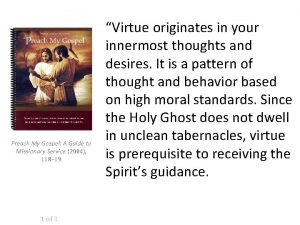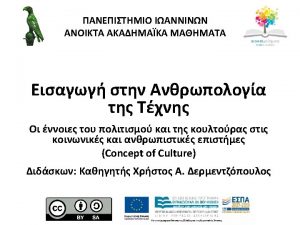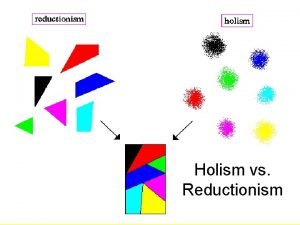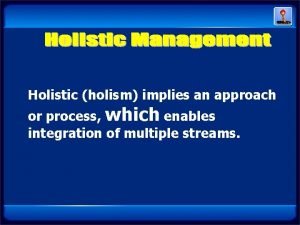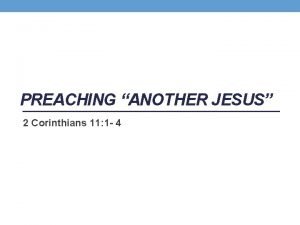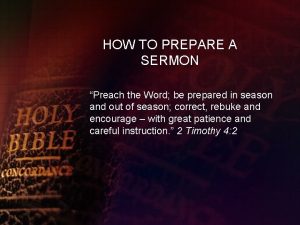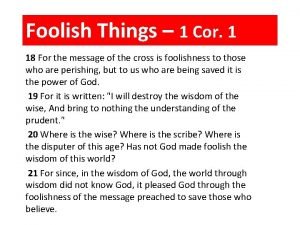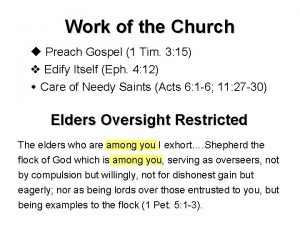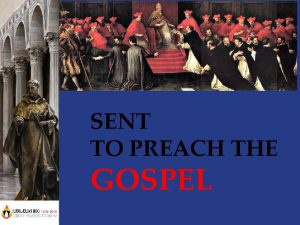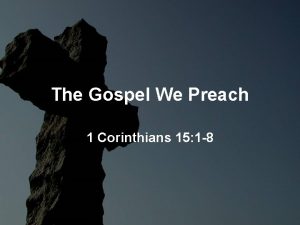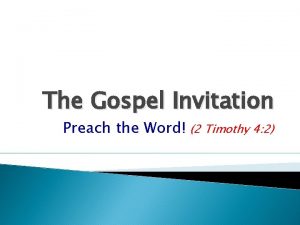Holism Can we preach the gospel and ignore


















- Slides: 18

Holism Can we preach the gospel and ignore the social plight of men? How much involvement in their lives is helpful and how much is damaging to their own development?

Why target the whole person? 1 2 3 4 Majority of UPG’s are extremely poor 1/3 rd of earth’s pop (2 B) need survival help Holistic ministries seek a spiritual, social, personal and physical transformation Roman Catholics and Liberals tend to focus in these areas

Holism in a Global Context of Missions n Migration Pop. Growth from 1. 4 B to 6. 2 B by 2000. n Undeveloped countries are 66% (4. 6 B) n 98% of pop. Growth in these regions n 1 in 10 are migrants (in 2002 40 M immigrants) n n HIV/AIDS By 2005 disease killed 22 M, with 42 M infected n 16, 000 infected daily n 13 M children have lost 1 or both parents to AIDS, which is 1/3 of all orphans in the world n

Holism in a Global Context of Missions 3 n Children at Risk Survivors who are most vulnerable are children Disabling or bonded child labor n Collateral damage of wars n Disease, drug abuse or consequences n Neglect or loss of family n Extreme poverty n Oppressive institutions Reduction in infant mortality rates = half (50%) of most countries is below 15 yrs of age Ten million exploited in sex slave trade In 2000 170, 000 Christian primary schools, 50, 000 secondary and 1500 institutes and colleges n n

How is it Proclaimed? Holism is one answer n n Conservative evangelicals gave priority to evangelizing the world and discipling the nations – this is called “prioritism” In the International Congress on World Evangelization in Lausanne in 1974 holism began to be more important than prioritism Liberation Theology taught the church’s mission is to promote justice in society and establish peace on earth. Three views of Holism: n Radical Liberationism leading to revolution from any oppressive regime to establish Marxist communities. n Two types of Holism: (Stott) seeks an equal priority of social and gospel priorities n Conversionism or Prioritism which focuses on gospel preaching and church planting, with little social ministry.

Two types of Holism (according to Hesselgrave) n Revisionist Holism Seeks an equal partnership between evangelism and social action (loving God and loving your neighbor) n Not as radical as Liberationism n n Restrained Holism Follows example of Jesus who preached the gospel to the poor n Attempts to prioritize evangelism while meeting urgent needs (though not all needs) n

Two Philosophies of Holism n Incarnational Holism n n Models after Jesus’ ministry Representational Holism: n Models after Paul’s ministry

Two Philosophies of Holism 1. Incarnationalist Holism n Seek the extension of Christ’s kingdom over the whole of life and society n Do not think much of priorities – witness is though of as “word, deeds and signs” of Jesus as the Transformer of societies and cultures as well as individuals n Stott sees Jesus making His mission a model for the church’s mission and ours. n The church is to be salt and light: if a community deteriorates socially or physically it is the failure of the church! n Sometimes this is called “Presence Evangelism”

Two Philosophies of Incarnational Holism A. Conversionist-incarnationalists Holism n Priority is given to discipling the ethne, all peoples, baptizing and instructing them while incorporating them into local reproducing churches n This is called “Confrontational Evangelism” n Both of these reject Liberationism n Both are aware of the risks involved in attempting to fashion contemporary missiology after the model of Jesus rather than the principles of Paul

Incarnationalism Missions Modeling modern missions after Jesus 1. 2. 3. 4. 5. Characterized by humble, self-sacrificial service on behalf of all people Willing to renounce his rights and privileges as the Son of God to identify with those he came to serve. Became poor servant to meet the needs of hurting people and powerless. Did not hesitate to engage in a power encounter with the demons to show His power Immersed himself in the affairs of local culture

Incarnationalism Missions Modeling modern missions after Jesus 6. 7. 8. 9. 10. Communicated, verbally and non-verbally in a way that people could understand. Spent most of his time training a few chosen disciples who would carry on his ministry Gave priority to prayer and fellowship with His heavenly Father Did not have a superiority complex, rather assumed a humble attitude in working with people Willing to suffer and die for the people He came to save.

Social Component Mandate of Incarnationalists n n Incarnationalists tend to apply evangelism while/after meeting the social needs that the people feel When the WCC was dominated by liberals missions became mostly social (mid 20 thcentury) n n n Instead of the lostness of people it became the plight of people as the major focus Paradigm shift: 1974 Lausanne Covenant: “We affirm that evangelism and socio-political involvement are both part of our Christian duty” “Both are necessary expressions of our doctrines of God and man, our love for our neighbor and our obedience to Jesus Christ. ”

2. Representational Mission Modeling modern missions after Paul 1. 2. 3. 4. 5. Characterized by humble, self-sacrificial service, giving up his rights to identify with and meet the needs of his target audience Concentrated on centers of learning and commerce, from which the gospel flowed Labored with his own hands to provide for himself and co-workers to give a model to his followers Considered himself an ambassador of Christ and, on Christ’s behalf, urged sinners to be reconciled to God Concentrated on raising up indigenous churches that would not be dependent on missionaries or other churches

Representational Mission Modeling modern missions after Paul 6. 7. 8. 9. 10. Did not spend a long time in each place, but chose to pick and train a few local leaders who could carry on his work Maintained contact with churches he had established with visits and letters exhorting them to walk worthy of their calling Encouraged believers in the churches to give generously to care for others Accommodated himself to new cultures, becoming “all things to all men” to save some. Maintained his authority as one commissioned by Christ while humbly confessing his unworthiness as a sinner and former persecutor.

Redefine or Balance n n n Some areas obligate a social platform to justify presence (i. e. RAC/CAC) Some opportunities can be integrated with evangelism (i. e. schools, clinics, orphanages) Temptation to avoid evangelism is tremendous in order to be successful or accepted Aid, medical, community development programs often become an end to themselves Avoid such programs that create dependency – participate in temporary programs that result in autonomy and self-sufficiency

Why is the danger so prevalent? n n n n n What model of social-evangelistic ministry do you know of in the US? What business-evangelistic ministry? What medical-evangelistic ministry? What Aid-evangelistic ministry? What engineering-evangelistic ministry? What sociological, linguistic, anthropological ministry? With very few, if any, models in our culture, that are effective, this makes the foreign task difficult to establish and maintain in priority The overwhelming belief is in “Presence” Evangelism – a silent witness Some such agencies have economic benefits that obligate a minimum of offense to clients (i. e. evangelism)

Summary of Holism n Charles Sheldon, In His Steps, helped develop a practical ethic around the question, “What would Jesus do? ” n n n His objective was the hope that “the application of Christian principles to the ordering of society would lead to the rectification of serious social evils and pave the way for the establishment of the kingdom of God on earth” -- Dominion Theology The results of its popularity and practice was the loss of the real gospel message, for the social gospel Once again the Incarnationalist WWJD has surfaced to become a priority in political, social and Charismatic focuses, often to the lack of the true gospel message.

David Hesselgrave quote: “There are strong indications that the 21 st century will be marked by major sociopolitical upheavals and a succession of natural disasters. Unless this new – among evangelicals – understanding of mission is successfully challenged, the likelihood of retaining the biblical priority of world evangelization in the face of unprecedented needs of every kind will become increasingly difficult. ”
 Preach my gospel chapter 3
Preach my gospel chapter 3 A programmer can choose to ignore an unchecked exception.
A programmer can choose to ignore an unchecked exception. Holism anthropology definition
Holism anthropology definition Holism psychology strengths and weaknesses
Holism psychology strengths and weaknesses Aulaclty unscramble
Aulaclty unscramble Gestalt holism
Gestalt holism Mantra of holism
Mantra of holism Jesus christ and him crucified
Jesus christ and him crucified How does a tiger walk in the cage
How does a tiger walk in the cage Abort retry ignore poem
Abort retry ignore poem Classless css
Classless css Dmca ignore server
Dmca ignore server Call 3 hali
Call 3 hali Dave engels
Dave engels 1 peter 1:13-16 nkjv
1 peter 1:13-16 nkjv Preach the whole counsel of god
Preach the whole counsel of god How to prepare to preach the word of god
How to prepare to preach the word of god It was a certain man in russia long ago
It was a certain man in russia long ago We preach christ crucified
We preach christ crucified
